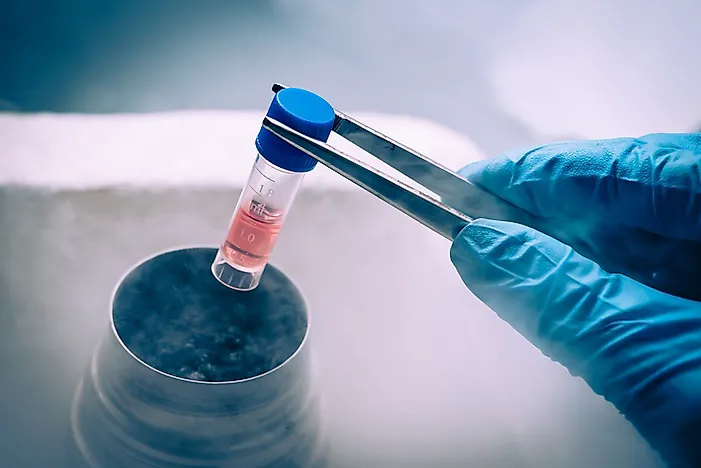 Stem cells have the ability to divide for indefinite periods in culture and to give rise to specialized cells. Endless research studies have focused on stem cells and the many conditions that could potentially be treated using them. Given their power, could stem cells hold the key to a cure for hearing loss or tinnitus? Before answering that question, let’s take a closer look at the structural components of the ear that are responsible for hearing.
Stem cells have the ability to divide for indefinite periods in culture and to give rise to specialized cells. Endless research studies have focused on stem cells and the many conditions that could potentially be treated using them. Given their power, could stem cells hold the key to a cure for hearing loss or tinnitus? Before answering that question, let’s take a closer look at the structural components of the ear that are responsible for hearing.
Over 25,000 hair cells exist in the cochlea, an organ in the inner ear. These cells are extremely important to the process of hearing, as they detect and respond to sound, transmitting nerve signals to the brain. Unfortunately, hair cells are also sensitive and unable to regenerate. Exposure to loud noises, aging, infections, and drugs can all inflict permanent damage on these vital structures.
 Research on stem cells and hearing loss has focused on the potential for stem cells to develop and function as hair cells. Scientists have discovered the presence of stem cells in the inner ears of mice, chicks, and zebra fish. Under the right conditions, the stem cells can develop into cells that are remarkably similar to hair cells. The question is, can we transfer this amazing ability to humans?
Research on stem cells and hearing loss has focused on the potential for stem cells to develop and function as hair cells. Scientists have discovered the presence of stem cells in the inner ears of mice, chicks, and zebra fish. Under the right conditions, the stem cells can develop into cells that are remarkably similar to hair cells. The question is, can we transfer this amazing ability to humans?
Although a cure does not yet exist, the results obtained thus far are promising. Researchers at Stanford Medicine and Rutgers University have all been making progress with research involving stem cells and hearing loss. In addition, scientists at Kyoto University in Japan have conducted research that may help with hearing loss and tinnitus.
Stanford Initiative to Cure Hearing Loss
Researchers at Stanford Medicine are working to develop a biological method to repair the cochlea and treat hearing loss. Their approach involves the surgical placement of stem cells within the cochlea, which then develop and function as hair cells. In their laboratory, they have mimicked the formation of embryonic mouse ears to create stem cells that look and act like hair cells. If millions of hair cells could be produced in the ear, this research could restore normal hearing to people afflicted by hearing loss.
Rutgers University–New Brunswick
 Scientists at Rutgers University–New Brunswick are also working with inner ear stem cells, converting them to auditory neurons and potentially reversing hearing loss. The challenge is controlling the division of the stem cells; if they divide too quickly, they pose a cancer risk. Currently, researchers can control the stem cells in a Petri dish.
Scientists at Rutgers University–New Brunswick are also working with inner ear stem cells, converting them to auditory neurons and potentially reversing hearing loss. The challenge is controlling the division of the stem cells; if they divide too quickly, they pose a cancer risk. Currently, researchers can control the stem cells in a Petri dish.
The study relies on the gene NEUROG1, which the scientists overexpress to transform the inner ear stem cells into auditory neurons. Due to its potential for proliferation, the researchers must be cautious when working with this gene. Managing the chromatin state of the targeted genes can reduce this dangerous tendency to rapidly reproduce.
Kyoto University
Finally, researchers at Kyoto University discovered a new way of applying stem cells that prevents their deaths. Stem cells often die due to failure to bypass the glial scar, a hallmark of neural damage that is thought to act as a barrier for cell transplantation.
The scientists found that applying the stem cells to the surface of the glial scar instead of underneath it helped them survive. The cells grew from the damaged segment of the auditory nerve, which carries information from the cochlea to the brain, and could help restore auditory function. Tinnitus sometimes results from an issue with the connection between external sound and the central nervous system, which is often caused by damaged hair cells in the cochlea. Thus, restoring this connection through stem cell transplantation could eliminate tinnitus.
 While the research is promising, the challenge for scientists is finding a way to prompt stem cells to differentiate in the ear without allowing them to die or grow uncontrollably. While the solution isn’t perfect yet, but the future looks bright for stems cells and hearing loss.
While the research is promising, the challenge for scientists is finding a way to prompt stem cells to differentiate in the ear without allowing them to die or grow uncontrollably. While the solution isn’t perfect yet, but the future looks bright for stems cells and hearing loss.
Source: https://www.soundrelief.com/stem-cells-and-hearing-loss/
